Meet Alice. She's 23 and grew up in south London. Find out about her job as a trainee engineer for Schneider Electric. Part of our Bitesize world of work series.
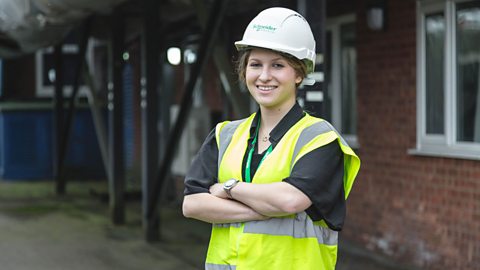
If you want it enough, you can do anything.
How would you describe your job?
My current placement is in tendering (putting bids together for projects), so my job involves a lot of problem solving and communication across teams in order to create a complete solution. It really makes me think on my feet. It’s slightly technical – I can go out to survey new or existing sites so I can better understand the project, develop a bid and put a price together – but it's also interpersonal and organisational. I find it really exciting as it's new and different from what I’ve done before.
What are your day-to-day tasks?
I’m still new so I’m shadowing one of the more experienced people in the company. We have a teaching environment in our office, so you can see how the systems work. At the moment, I’m learning about single-line diagrams, looking at different systems and learning about the processes that happen in a plant room, where the building services equipment for electrics, water, heating and air conditioning is stored.
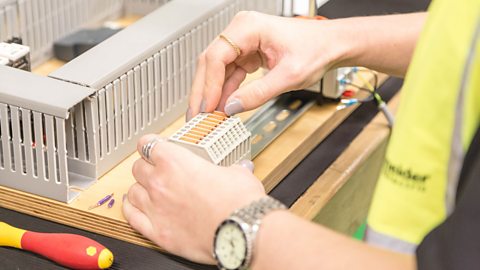
What skills do you use?
Interpersonal and networking skills are very important – sales, marketing and tendering are all about teamwork and being good with people. Time management and organisational skills are also very important.
I use some skills that I learnt at school as well, such as Design & Technology. I also use the problem solving and thinking skills that I learnt in Maths.

What choices did you make to ensure you had the right qualifications?
I researched and made sure that I chose the correct subjects for A-level. If you know what you’re interested in you can look for what universities might ask for and choose those subjects.
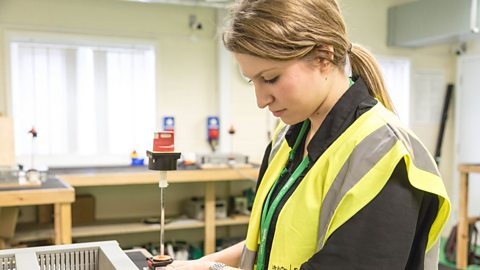
What was your educational career path?
I was always interested in engineering. When I was 16, I went on a girls-only Nautical Engineering course – I really enjoyed it and it confirmed that engineering was for me. Sadly, not many girls consider STEM subjects (and engineering in particular) as a career choice, mostly through a lack of information and stereotyping.
I moved to Hong Kong for sixth form and did the International Baccalaureate. I then applied to university in the UK to do a Mechanical Engineering course. I did a foundation course first because I needed to improve my Maths grade, before doing my university degree, and this gave me a really good grounding in engineering.
I also did lots of work experience while I was at university. I worked in a shot blasting factory, a panel builders where I helped to build air-conditioning units, and I went to a toothbrush factory in China. I also did an internship at JCB in the summer before I got this job.

Is this the job you always knew you wanted to do?
In many ways, yes. I always knew I wanted to work for a company that aimed to make a difference in the world, and we do that. We’re constantly trying to improve and innovate with new products. I always knew I wanted to be an engineer as well, although what I do at the moment uses fewer technical skills and more skills like communication and organisation.

Top tips
Do your research. Find out which qualifications you need to get into the job you want
The road isn't always smooth but you can get there
Don’t listen to anyone who tells you you can’t do it. If you want it enough, you can do anything.

What to expect if you want to be an engineer
- How many people work in the engineering sector?
- What can you earn in different roles?
- What routes can you take to get in?
- Is the demand for engineers expected to grow in the future?
Watch the film to find out the answers to these questions, and much more!
Other resources
- See what type of engineering role might suit you with the
- Find out more about the different areas of engineering with this
- Learn more about roles in engineering with the
- Discover a practical new way to study via .
For careers advice in all parts of the UK visit: , , and .

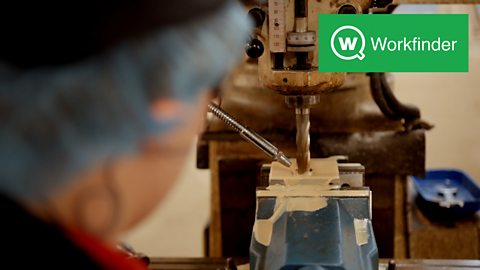
Find work experience placements with Workfinder.
Tips and advice
Help with interviews, writing a CV and all things work experience related.


How to become an engineer. collection
Find out more about the engineering sector and how those currently working in it got their foot in the door.

Amy: Formula 1 engineer
Amy helps develop ways to make racing cars go faster.
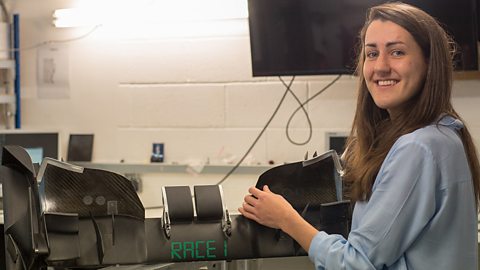
Zoe: apprentice site engineer. video
Zoe's helping to build a London tube station.
